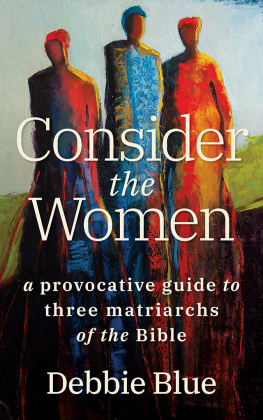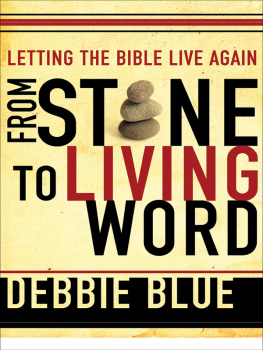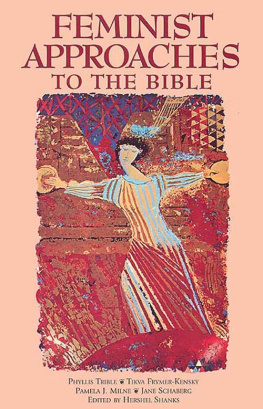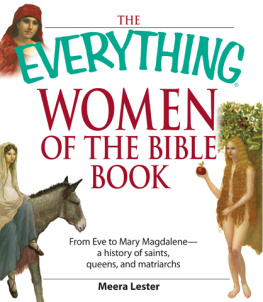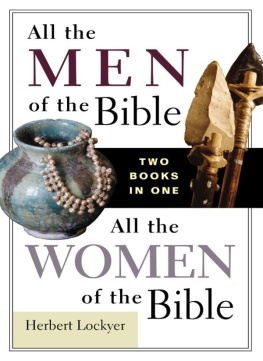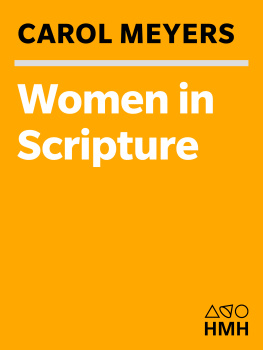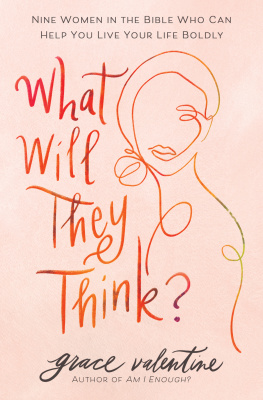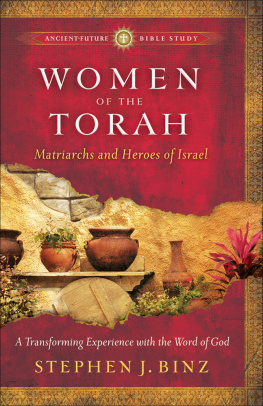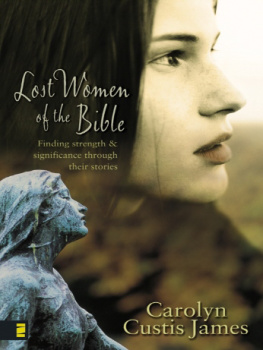Consider the Women
A Provocative Guide to
Three Matriarchs of the Bible
Debbie Blue
WILLIAM B. EERDMANS PUBLISHING COMPANY
GRAND RAPIDS, MICHIGAN
Wm. B. Eerdmans Publishing Co.
4035 Park East Court SE, Grand Rapids, Michigan 49546
www.eerdmans.com
2019 Debbie Blue
All rights reserved
Published 2019
252423222120191234567
ISBN 978-0-8028-7429-0
eISBN 978-1-4674-5249-6
Library of Congress Cataloging-in-Publication Data
A catalog record for this book is available from the Library of Congress.
Contents
Stories migrate secretly. The assumption that whatever we now believe is just common sense, or what we always knew, is a way to save face. Its also a way to forget the power of a story and of a storyteller, the power in the margins, and the potential for change.
Rebecca Solnit, Hope in the Dark:
Untold Histories, Wild Possibilities
I like reading old storiesas many of them as possibleancient Egyptian myths about a vulture-mother-goddess, Iroquois legends, the Korean story about the boy born to a fairy and a laurel tree who makes his way through high waters, saving ants and mosquitos from the flood. Or the Mayan story about the maize god resurrected from the carapace of a turtleassisted by dwarves. I find a fascinating and expansive array of illuminating and beautiful and troubling old stories across cultures.
Old Bible Stories
But the stories that have a uniquely formative place in my life are Bible stories. Ive heard them from day oneprobably even in the womb. At some moments in my life, I was a bit bitter about thiswhat could be less sophisticated or more mundane than growing up a Baptist in Indiana? What if I had been raised by French intellectuals or Navajo elders?
At this late stage in my life Im surprised I still spend most of my days (Im not kiddinghours and hours) immersed in these same old Bible stories. I promise you it is not about blind loyalty. It has something to do with the fact that Im a minister, so its my job, but it is also that these stories seem to have an endless capacity to reveal glimpses of God, what it is to be human, things we might rather keep hidden, what is under the surface of everyday life. I am grateful for these stories that persist in baffling and nourishing me.
But I believe Scripture loses some of its capacity for revelation if we dont enter it honestly as women weary of patriarchy or as people who have seen so much injustice go down that they will never stop questioning authority. The Bible loses some of its capacity for revelation if we dont bring our questions to it. The Bible invitesalmost demandsour questions.
Sometimes you might have to take a pitchfork to it to loosen the soil. Nothing grows in hard-packed, solid ground. Plus, using a pitchfork might just feel cathartic. Scripture has been used in so many destructive ways. It has had enormous influence throughout cultures all over the world. Bible stories are founding narratives for many people in the Jewish and Christian religions, as well as in Islam. Certain readings have produced some terrible, violently divisive theologywhite supremacist, misogynist, anti-Semitic, Islamophobic, homophobic theology. Some readings have given rise to ideas about human exceptionalism that have contributed to the demise of the planet. If you want to strike the Bible with a pitchfork, I think the Merciful Lover of Creation would be okay with that.
New Stories
I know Im not the only one feeling a bit hopeless about the state of the world. I had to pull off the interstate the other day because torrential rain was causing minor flooding. It wasnt really a big deal, but in the moment I felt furiouslike, really? Cant just one little half hour go by without something happening to remind us we are doomedviolent weather, violent men, Charlottesville, North Korea, Houston, unprecedented heat, unprecedented floods, unprecedented fires, flooding on the interstate?
Lately Ive been keeping the radio off when Im in the car to try to give myself room to breathe and to be present to what is in front of me, but as I waited for the rain to let up Im thankful I turned it on. Krista Tippett was interviewing author Rebecca Solnit. Sometimes you need to hear from someone who is smart with a robust commitment to hope when yours is wavering.
Rebecca was telling Krista that she thinks people in this culture seem to love certainty more than hope and what we need to do is let go of the certainty. The future is dark in that it is unknown. But there is a sense of possibility in the unknown, not inevitable doom. Love is made in the dark. If you dont know Solnits work, she is nothing at all like a false optimist. But she believesshe has seen, she saysthat in the aftermath of Katrina and other crises, disaster can move us into a place of non-separation and compassion, and engagement and courage,... and generosity. Instead of falling apart, she says, we could fall together.
As Ive been reading and writing about stories, I was especially alert to what she was saying. We need to think about the stories we tell and their consequences, she said. People live and die by stories. We need more stories, better stories, more complex stories. We need to ask if there are better ways of telling our old stories and if there are stories that we fail to tell about those players who are not in the limelight.
I started scribbling notes on an oil-change receipt so I might incorporate her words in this introduction. This book is about engaging old stories in new waysasking questions about them, looking for hope. If the biblical stories are contributing to destruction and cruelty, if they are not helping us, then we better work on the way we are reading them and telling them. They are not going away.
One of the beautiful things about having a canon is that you can look back and see an endless matrix of interpretation unrolling over hundreds, even thousands, of years. The stories are told and retold, stretched, and excavated. They are read differently in every ageforever generating new meanings and new life for people in the times and places where they live.
I am not always fond of the way the church fathers interpreted the Bible. They had too many problems with sex, women, and Jewish people. Jerome said, The intimacies of Mesopotamia died in the land of the Gospel, like this was a cause for celebration. He thought it was good to leave behind messy, embodied, human relationships, whereas I rather like them. The way Jerome and Tertullian and Pope Gregory the Great read the Bible had a lasting effect on the way the Christian faith developed, but clearly and luckily, the process of interpretation did not stop with them.
As a preacher, I am thrilled when a scriptural passage that includes the intimacies of Mesopotamia turns up in the lectionary. I especially like to preach on passages that include women. This doesnt happen as often as Id like. After the 2016 US presidential election, my church, House of Mercy, decided to create an alternative lectionary. Every week in the church year, we would preach on texts that include womensome familiar, some who never turn up in the lectionary: Mary, Miriam, Zelophehads daughters, Mrs. Potiphar, Jephthahs daughter, Judith, and the Whore of Babylon, among others.
We did it because people live and die by stories, and we felt a sense of urgency about finding alternative ones that might help subvert the dominant ones. The world of Scripture (and much of the history of the church and culture, politics and media, theology and philosophyliberal and conservative) offers a mostly male narrative. We need to bring out, pay attention to, read, and reread the stories of women in the Bible (and beyond) because the status quo isnt working out very well for the majority of people on earth (people in low-lying island-nations; the Standing Rock Sioux; the Bangladeshis; Syrian refugees; black and brown men, women, and children in the United States of White Supremacy). The status quo is not working out for the earth itself. The whole arc of the biblical narrative calls us to question the systems of power that are in place, and it gives us stories to help us do that. Yes, the dominant narrative in the Bible is the male narrative, but there are many other stories to tell.

